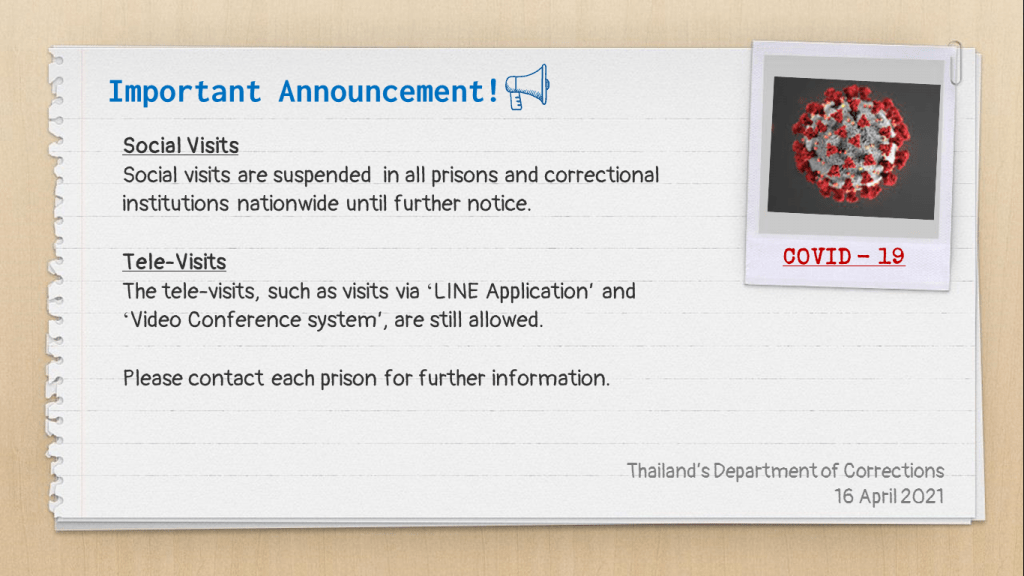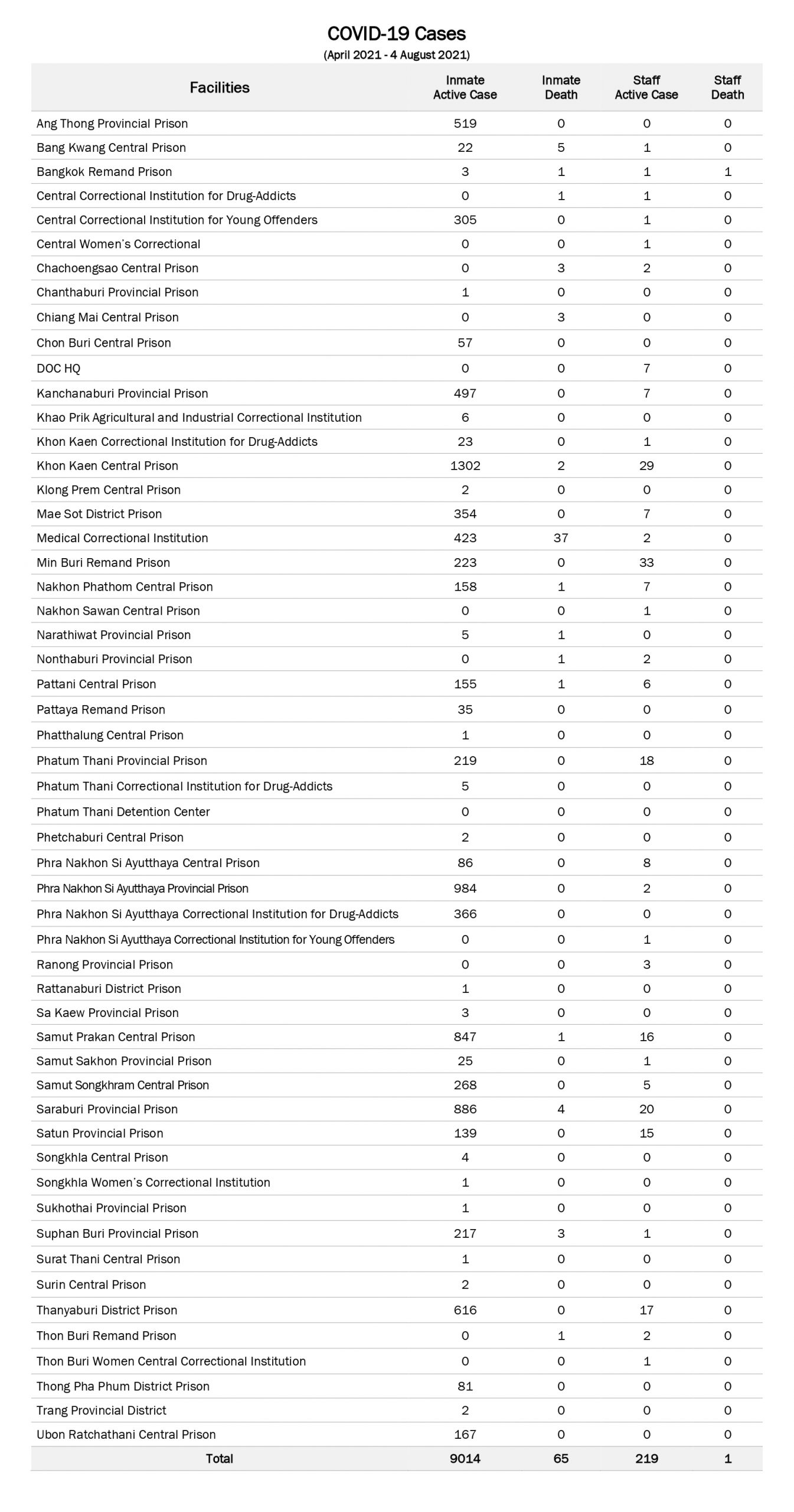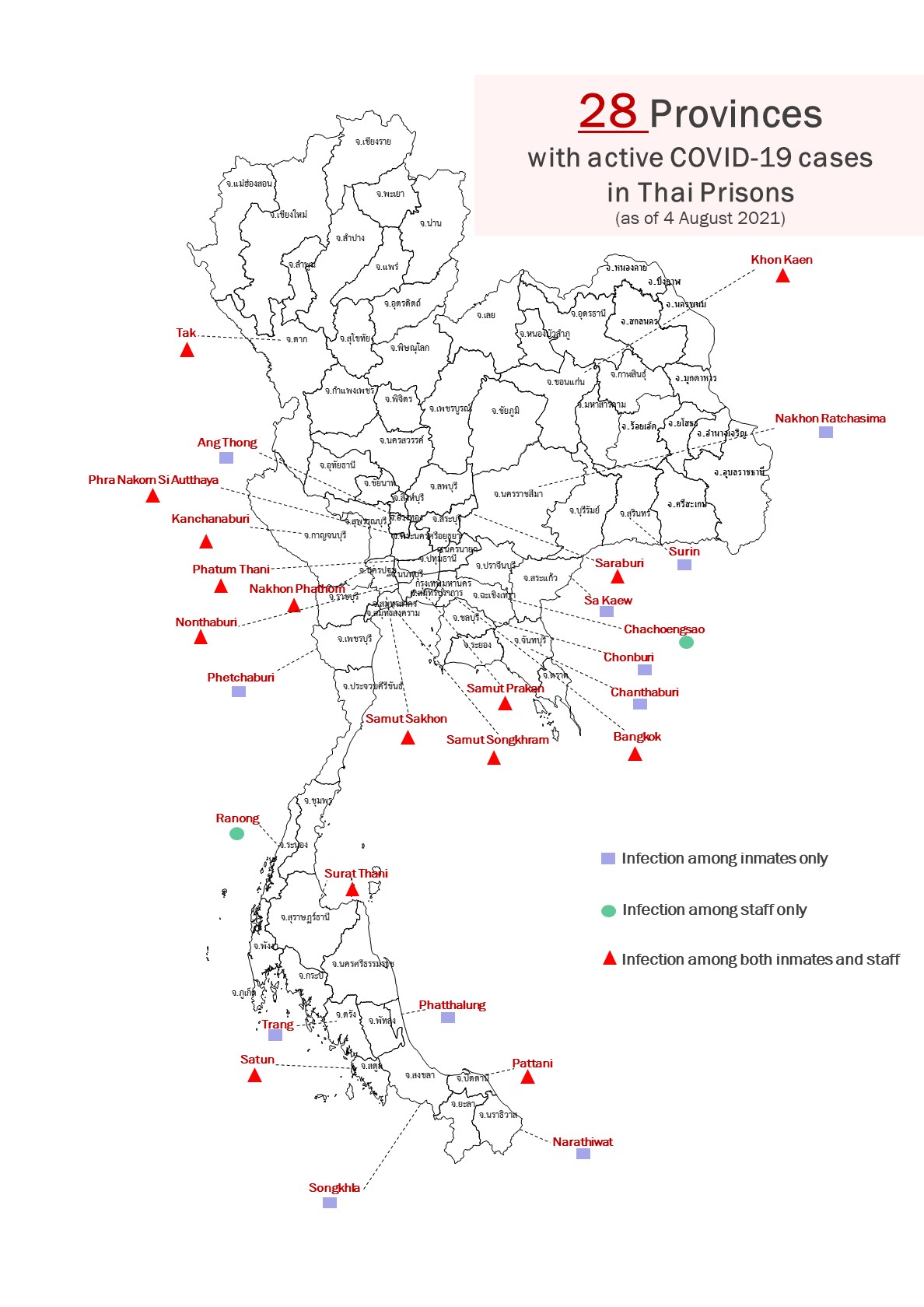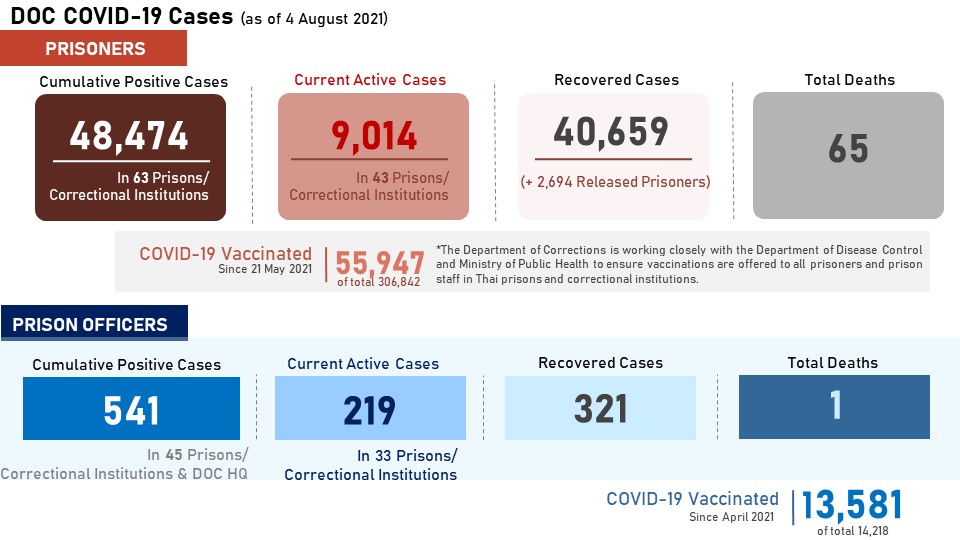COVID-19 Updates
Due to the COVID-19 situation, the Department of Corrections has launched measures for COVID-19 prevention and control in prisons/correctional institutions to ensure the safety of our staff, prisoners, visitors and efficient operation. These measures will be effective until further notice.
Visits/Prisoner or Prison Contacts
1. Social visitation in all prisons/ correctional institutions is now suspended. Alternative methods to visiting and contacting prisoners are offered as follows;
a. Online visit via LINE application;
b. E-mail delivery. Upon receiving the e-mail, prisons/correctional institutions shall print and deliver the message to the indicated prisoners;
2. All prison visitation for educational/researching purpose is suspended;
3. Professional visits (i.e. for inquiry officers/ probation officers/ lawyers) will be considered on a case-by-case basis and delivered in accordance with disease prevention guidelines by the Ministry of Public Health prior to entering the prison/correctional facilities in a rigorous manner.
** LINE Visit Rules **
1. Only those who have been listed in the 10 name list are allowed to visit the prisoner. Persons other than those of the 10 names are not allowed to join the online visit.
2. Any message or content that are against the law, morality and social norms are prohibited.
3. Taking photos and recording videos during the online visit are prohibited and may result in immediate termination of the online visit as well as permanent revocation of online visiting privileges.
4. The DOC staff reserves the right, at any time and without prior notice, to act as they deem appropriate for maintaining order and security during the visit.
* Please be noted that, due to security reasons, the visit rules and regulations of each prison/correctional institution’ may differ according to the characteristics of the correctional facilities. Kindly contact the prisons/correctional institutions directly for further information.
Contact List for Online Visit
(LINE Application & Tele-Conference)
Prisoner Welfare Shop and Money Deposit
1. Face-to-face transaction at the prisoner welfare shops is suspended but order and payment can be proceeded via prisons/correctional institutions’ Facebook or LINE application;
2. Money deposit is still allowed but will be proceeded with more precaution and measures;
3. Depositors are encouraged to deposit money via postal order or online money transfer (if applicable) than directly deposit money at prisons/correctional institutions.
Prison Management
1. Inmates’ appointment to see the doctors at the hospital outside the prison shall be postponed but the prisons shall contact the doctors of each individual case to maintain continuous medication (if applicable or does not affect inmates’ health condition) unless it is an emergency case where the inmate must be transferred to the hospital according to DOC’s rules and regulations.
2. Health care services provided by external public health care units shall be suspended until further notice or until the situation becomes less serious or if it is necessary.
3. All prisons’ facilities must be cleaned every day. Sinks and soap will be provided at toilets, kitchens, canteens and alcohol gel shall be provided from outside the entrance to within the prison area.
4. All prisons shall assign prison volunteers to the correctional infirmaries where they can help screening sick inmates and their symptoms so that isolation for the COVID-19 suspected case can be conducted in time.
Prisoner Welfare Shop and Money Deposit
1. Face-to-face transaction at the prisoner welfare shops is suspended but order and payment can be proceeded via prisons/correctional institutions’ Facebook or LINE application;
2. Money deposit is still allowed but will be proceeded with more precaution and measures;
3. Depositors are encouraged to deposit money via postal order or online money transfer (if applicable) than directly deposit money at prisons/correctional institutions.
How do we screen inmates, staff, and outside persons?
1. Newly admitted inmates and inmates who have visited hospital outside the prison or returned from the court (considered as newly admitted inmates) will be all put in quarantine for 14 days and have their body temperature checked every day (regardless of having no COVID-19 symptoms). During quarantine, they must wear masks at all time. In case one is found having over 37.5 °C together with respiratory symptoms such as cough, runny nose, sore throat, fast breathing or difficult breathing, the prison will contact the referral hospitals or the local public health units to help observe, prevent and control the disease and isolate the suspected inmate from others.
2. Screening for newly admitted inmates will be intensively conducted on those whose temperature is over 37.5 °C together with having respiratory symptoms such as cough, runny nose, sore throat, fast breathing or difficult breathing, especially if they have had, within 14 days, :
- close contact with COVID-19 suspected patients or
- occupational exposure to tourists from COVID-19 affected areas or
- been to crowded areas in where COVID-19 confirmed cases were found or
- travelled to/come from or lived in the areas reported having COVID-19 outbreak.
Any cases found matching the above criteria will be reported to the referral hospitals or public health units immediately.
In case the inmates have met one of the criteria above but do not show any symptoms, the inmates will be put in quarantine for 14 days with daily body temperature check.
Inmates with vulnerable conditions (over 60 year old inmates, inmates with chronic pulmonary diseases, uncontrolled diabetes, obesity or inmates with pregnancy and children) will be put in specific areas for specific care.
3. All inmates will have body temperature checked before leaving and after getting in the prison cell. If found having over 37.5 °C, he/she will be put in quarantine for 14 days.
4. All prison staff must be screened. If found having over 37.5 °C or having any cold symptom such as cough, runny nose or sore throat, they will be suspended from work and advised to meet doctors.
5. All outside persons will be screened. This includes medical staff and prison food product deliverers etc. If found having the temperature over 37.5 °C, they must not enter prison facilities.
6. All medical staff must perform their duty at the infirmary with Standard Precautions strictly at all time.
How do inmates and staff protect themselves from the disease?
1. All prisons must provide their correctional staff with face masks and face shields for the staff having close contact with inmates and outside persons, especially at the screening point, the searching point and the correctional infirmary.
2. All prisons must provide masks and alcohol gel to be used in prisons such as at the gate areas and prison vehicles.
3. All prison vehicles must have masks available for all inmates to be transferred to the court.
4. All inmates must wear masks at all time.
5. Quarantined inmates will be provided with separate set of cutlery and canteen zone. This cutlery is also separately washed to prevent and control disease spreading.
6. To prevent the disease from diffusing into the air, all prisons will have their toilets covered when they are not in use.
What else can we do to prevent the spread of the disease?
1. All staff will strictly perform their duty while being aware of keeping social distance between inmates, staff and outside persons.
2. All prisons will perform their duty in accordance with the prevention and control measurements by the Emergency Operation Centre, Department of Disease Control.
3. To keep our inmates safe and healthy and prevent spreading the virus, we have suspended vocational training both outside and inside the prison. Other activities that may be against social distancing practice are also cancelled and suspended.
How to get informed whether foreign inmates are infected with COVID-19 or not?
DOC has requested prisons and correctional institutions nationwide to quickly inform the embassy/consulate of the foreign inmates tested positive for COVID-19. The information to be provided includes inmates’ ;
– personal information, age, nationality, prisoner class,
– offences, sentence terms and release date,
– positive test result for COVID-19,
– date of SWAB performing and current condition.
In case the embassies/consulates would like to know the information of specific inmates, we suggest directly contact the prisons/correctional institutions as DOC has assigned prisons/correctional institutions’ C.A.R.E. (Center for Assistance to Reintegration and Employment) to inform the relatives and family members of the infected inmates as well as periodically report them the inmate’s conditions in order to reduce their anxiety.
As of 25 May 2021, there are COVID-19 outbreaks in only 15 prisons/correctional institutions nationwide. Please visit DOC’s English official website for more information of the weekly updates on COVID-19 situation or daily press release in Thai on https://www.facebook.com/prthaidoc/
What are the DOC guidelines for delivering treatment to the inmates tested positive for COVID-19?
DOC focuses on rapid COVID-19 testing among inmates in order to immediately separate the infected for receiving treatment in accordance with the Ministry of Public Health’s standards. As of now, the infected cases are classified into three groups which are;
– “Green” for the asymptomatic patients, who have no risks of developing serious diseases or comorbidity,
– “Yellow” for patients with no severe symptoms, no pneumonia but have risk factors such as patients over the age of 60 or patients with Chronic Pulmonary Disease, Chronic Renal disease, Coronary Artery Disease and Mild Pneumonia,
– “Red” for patients with pneumonia, asthma, exhaustion after a short walk, breathing difficulties or patients detected with pneumonitis.
Patients classified as Green and Yellow will be separated or sent to field hospitals while patients of Red group will be transferred to the referral hospitals for receiving anti-virus medication and treatments in accordance with the Department of Medical Services.
Will the inmates be vaccinated?
The Department of Corrections has been confirmed by the Department of Disease Control and the Ministry of Public Health that vaccination will be arranged and allocated to inmates and staff in prisons/correctional institutions nationwide. COVID-19 vaccinations are now being rolled out to inmates at Min Buri Remand Prison and Phuket Provincial Prison. Yet, the vaccination rollout will progress in line with DOC and the Department of Disease Control’s policy on prioritizing the inmates with mortality risk such as those with underlying diseases and those over the age of 60. Priority of vaccination rollout will also be given to correctional facilities with no outbreaks, or those of large in size and population density.
What are DOC’s temporary release policies for relieving the overcrowding condition?
It should be noted that releasing inmates is not an act that can be done arbitrarily. The discretion to release the inmates, especially unconditional release such as probation, must be conducted through legal process. DOC has prepared launching measures for reducing prison overcrowding to be implemented among 2 groups of incarcerated persons as follows;
– Awaiting-trial prisoners are encouraged to submit request for release on bail to the Office of the Judiciary of which DOC has already coordinated with,
– Convicted prisoners who will benefit from the special probation schemes which include drafting probation projects for convicted prisoners who are sick during COVID19 outbreak situation or suffering from underlying diseases which might have COVID-19 mortality effects.
In order to ensure the safe and secure implementation of such measures, the inmates must meet all requirements for special probation consideration. Furthermore, DOC is proposing amending requirements for two special probation projects which include extending the duration of sentence terms to be eligible for probation, from 5 years to 7 years, and allowing inmates to attend external rehabilitation programs as listed by the Department of Probation in order to provide more opportunities for the inmates to meet such requirements. DOC estimates that these projects, which are now under the consideration of the Ministry of Justice, would help reduce prison population density at some level.
What to do if I want to donate money or provide supports on medical supplies?
You can donate at the Department of Corrections or the Medical Correctional Institution, the only DOC referral hospital which provides medication and treatments for inmates infected with COVID-19 in Bangkok. You can also donate at other correctional facilities directly. The Department of Corrections would like to extend its gratitude and appreciation to all kind supports and donations.





